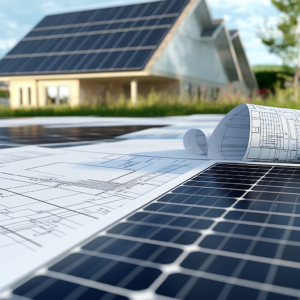As Cape Town embraces renewable energy, more homeowners and businesses are opting to install solar photovoltaic (PV) systems, not only to reduce their carbon footprint but also to counter escalating energy costs. However, integrating solar PV systems with existing electrical infrastructure presents unique challenges that must be navigated carefully to ensure safe, efficient, and compliant operations.
This guide explores the best practices and common challenges when integrating solar PV systems into Cape Town’s electrical setups, particularly highlighting considerations for safety, regulatory compliance, maintenance, and optimization.

Assessing Existing Electrical Systems
Before embarking on any solar PV installation, it’s critical to assess the compatibility of existing electrical systems. This step helps identify any necessary upgrades or modifications to accommodate solar power without overloading or risking faults in the system.
Understanding Load Capacity and Consumption
One key factor is determining the current load capacity of the building’s electrical infrastructure. Solar PV systems generate additional power that the existing distribution board and circuits must handle, particularly during peak sunlight hours. If the load exceeds what the current wiring or distribution board can support, this can lead to system failures or potential fire hazards.
Steps for Assessment:
- Hire a professional electrician to examine the distribution board, assess wiring conditions, and identify possible weak points.
- Calculate expected load additions from the solar PV system to predict any risk of overload.
Upgrading Distribution Boards for Solar PV Compatibility
In many cases, older distribution boards cannot safely handle the influx of power generated by solar PV systems. Upgrading the distribution board is a necessary investment to prevent potential hazards and ensure an efficient flow of electricity.
Why Upgrading is Essential
A modernized distribution board can better manage the variable power flow that comes with solar PV systems. Enhanced boards provide features like integrated surge protection, optimized for renewable energy inputs.

Key Considerations for Distribution Board Upgrades:
- Compatibility with solar PV inverters: Ensure that your board is compatible with the inverter’s specifications for seamless energy conversion.
- Surge protection: Solar installations can experience power surges, particularly during thunderstorms or grid fluctuations. Surge protection on distribution boards is essential to shield both the solar equipment and other appliances from damage.

Earthing and Lightning Protection
In Cape Town, where thunderstorms and lightning strikes are a seasonal reality, proper earthing and lightning protection systems are crucial for any solar PV setup. These systems help protect both the building’s electrical infrastructure and the solar equipment.
Earthing Considerations for Solar PV Systems
A well-grounded PV system minimizes the risk of electrical faults. Proper earthing routes any excess charge safely into the ground, protecting the entire system and reducing the likelihood of shocks or equipment damage.
Lightning Protection Tips:
- Install surge protectors: Surge protectors on distribution boards act as a buffer against voltage spikes during lightning storms.
- Consider rooftop protection rods: If your solar PV panels are installed on the roof, grounding rods can reduce the risk of direct lightning strikes.
Regulatory Compliance for Solar PV Systems
Solar PV installations in South Africa, including Cape Town, are subject to regulations to ensure they meet safety and performance standards. Compliance isn’t just a legal requirement—it also helps prevent issues with insurance claims and resale.
Navigating Cape Town’s Regulations
Cape Town’s regulatory framework requires adherence to specific standards for electrical installations. Here are some best practices for meeting compliance:
- Ensure your installation is SANS-compliant: The South African National Standards (SANS) provide guidelines for electrical installations. Solar PV systems need to comply with SANS 10142, which covers the safety aspects of low-voltage installations.
- Certification: Work only with certified electricians and contractors. Certification ensures that your solar PV installation meets regulatory standards, especially regarding safety features like earthing and circuit breakers.

Maintenance and Fault Finding for Long-term Efficiency
Like any other electrical system, solar PV installations require routine maintenance to ensure ongoing efficiency and performance. Regular checks also help spot potential issues early, preventing costly repairs down the line.
Regular Maintenance Tips:
- Inspect wiring and connections: Over time, wiring may loosen due to temperature changes and vibrations. Schedule routine inspections to ensure all connections remain secure.
- Monitor inverter performance: The inverter is central to converting solar energy into usable power, so keeping an eye on its efficiency is essential.
- Clean panels regularly: In Cape Town, dust and bird droppings can accumulate on panels, reducing their efficiency. Cleaning your panels every few months can significantly improve energy output.
Fault Finding in Solar PV Systems
Fault finding is especially important in integrated systems. Issues such as tripped breakers, reduced output, or erratic power supply can be traced back to either the solar PV setup or existing electrical infrastructure. Employing fault-finding techniques helps pinpoint the source of problems quickly.
Pro Tips for Fault Finding:
- Use a digital multimeter: Test for voltage, current, and continuity to identify where issues may be occurring in the system.
- Check for shading: Sometimes, reduced output is due to shadows from trees, chimneys, or other obstructions. Ensure panels are optimally placed for year-round sunlight.

Optimizing Solar PV Systems in Cape Town’s Unique Climate
Cape Town’s climate poses unique challenges for solar PV systems, from high wind speeds to unpredictable weather patterns. Here are some strategies to optimize solar PV performance in Cape Town’s environment:
- Panel positioning: Cape Town’s latitude requires solar panels to be angled correctly for maximum exposure, particularly during the shorter winter days.
- Weatherproofing: Panels and wiring should be adequately weatherproofed to withstand rain, heat, and wind.
- Consider battery storage: Adding battery storage to your PV system can store excess power generated during sunny days, providing backup energy during cloudy periods or power outages.
The Future of Solar PV Systems in Cape Town
Integrating solar PV systems with existing electrical infrastructure offers both economic and environmental benefits. However, as with any significant electrical upgrade, careful planning and attention to best practices are essential to maximize safety, efficiency, and regulatory compliance.
Cape Town’s electrical landscape is evolving, and with the right expertise and strategic approach, your solar PV system can be a powerful addition to your energy mix, enabling you to save on electricity costs and contribute to a more sustainable future.
Whether you’re looking to install your first solar panels or upgrade an existing system, working with experienced Cape Town electricians, such as those at Electrogem, will ensure your project runs smoothly and meets all local requirements.
